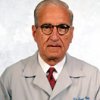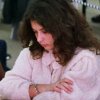Ivan S. Ciric was born on December 15, 1933 in Vienna, Austria. Dr. Ciric grew up in Sremski Karlovci. He received his M.D. degree from the University of Belgrade and Doctor of Medicine from the University of Cologne, Germany. Dr. Ciric trained under Professor Wilhelm Tonnis at the University of Cologne from 1961 to 1963 and under Dr. Paul Bucy at Northwestern University Medical School from 1963 to 1967. That year he received additional training in stereotactic surgery under Dr. Claude Bertrand and in pituitary surgery under Dr. Jules Hardy at the Notre Dame Hospital in Montreal. Dr. Ciric is Professor of Neurosurgery at Northwestern University Medical School, Vice Chairman of the Department of Neurological Surgery and Chief of the Neurosurgery Service at the Evanston Hospital where he holds the Bennett - Tarkington Chair of Neurosurgery.
Upon joining the staff of The Evanston Hospital and the Northwestern University faculty in 1967, Dr. Ciric introduced microsurgical techniques in the treatment of various neurosurgical disorders. Over the years, he has developed special interest in the microsurgery of pituitary tumors, acoustic neuromas, meningiomas, cerebral gliomas and of various spinal disorders.
Dr. Ciric's research interests have been in the developmental anatomy of the pituitary gland capsule, of pituitary tumors, of craniopharyngiomas and of colloid cysts. He also studied the vertebral venous circulation in primates. His clinical research include studies on the role of surgery in the treatment of malignant cerebral gliomas, with emphasis on the immediate and long term outcomes of gross total removal of these tumors and studies of lateral recess stenosis as a component of the spinal stenosis syndrome. Dr. Ciric also collaborated in studies evaluating the utility of various imaging modalities as they became available including radionuclide scans, computerized tomography and magnetic resonance imaging of various intracranial and spinal disorders.
Dr. Ciric's extracurricular interests include athletics, reading and travel. Dr. Ciric and his wife Anne have three children, Alexandra, Katherine, and Stephen.
Medical School:
- MD, University of Belgrade, Yugoslavia
Postgraduate:
- Doctor of Medicine, University of Cologne, West Germany
Internship:
- University of Belgrade Hospitals and Clinics
Residency:
- General Surgery, Department of Surgery, Hedwig Clinic and Hospital, Mannheim, West Germany
- Neurological Surgery, Department of Neurosurgery, University of Cologne, West Germany
- Neurological Surgery, Northwestern University, Chicago Wesley Memorial Hospital
- Neurological Surgery, Northwestern University, Veterans Administration Research Hospital
- Neurological Surgery, Montefiore Hospital, New York City
- Neurological Surgery, Notre Dame Hospital, Montreal, Canada
Honors and Awards:
- Member, Council of Affiliate Societies, Illinois State Medical Society, 1978-1979.
- Secretary-Treasurer, Chicago Neurological Society, 1975-1976.
- Vice-President, Chicago Neurological Society, 1976-1977.
- President, Chicago Neurological Society, 1977-1978.
- Selected to serve on the Impartial Medical Testimony Panel, March, 1981.
- Editorial Board, Surgical Neurology, 1981-1990.
- Editorial Board, Neurosurgery, 1992-present.
- Secretary-Treasurer, Central Neurosurgical Society, 1984-1985.
- Vice-President, Central Neurological Society, 1985-1986.
- President, Central Neurological Society, 1986-1987.
- Guest examiner, American Board of Neurological Surgery, 1989, 1996.
- Advisory Board, Chirurgia Neurologica, 1990-present.
- Participant, Glioma Outcomes Project.
- Holder of Arlene and Marshall Bennett and Joseph A. Tarkington Chair in Neurosurgery, Evanston Hospital, NorthShore University HealthSystem, 1988-present.
- Selected as Master of Neurosurgery at the Congress of Neurological Surgery, San Diego, CA, September 30-October 4, 2001.
- Moderator, Inter-Urban Neurological Society, 1995-present.
Professional Memberships/Affiliations/Activities:
- (1968-present) American Medical Association and Its Affiliates
- (1968-present) Chicago Neurological Society
- (1969-present) Central Neurological Society
- (1969-present) Inter-Urban Neurological Society
- (1969-present) Congress of Neurological Surgeons
- (1970-present) Illinois Neurosurgical Society
- (1971-present) American Association of Neurological Surgeons
- (1972-present) Chicago Surgical Society
- (1975-1985) Institute of Medicine of Chicago
- (1976-present) Neurosurgical Society of America
- (1979-1985) Societe Internationale de Chirurgie
- (1980-present) Society of Neurological Surgeons
- (1980-present) American College of Surgeons
- (1981-1985) Midwest Bio-Laser Institute
- (1983-present) International Society of Pituitary Surgeons
- (1984-present) Laser Association of Neurological Surgeons
- (1991-present) Charles McMicken Society, Cincinnati, Ohio
- (1992-2000) The Society of Surgical Oncology, Inc.
- (1993-2000) Foundation for International Education in Neurological Surgery, Inc.





